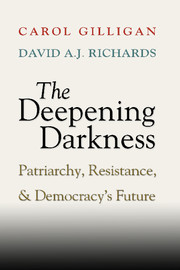10 - The Contemporary Scene
Published online by Cambridge University Press: 01 September 2010
Summary
In contemplating democracy's future, we turn to the contemporary scene and enlarge the scope of our analysis to include other cultures. At home, our politics has become increasingly polarized under the influence of a fundamentalism that wars precisely on what made possible the most important and effective resistance movements in American history: namely, any love that resists the Love Laws of patriarchy. Internationally, Christian, Islamic, Hindu, and Jewish fundamentalists are united in their patriarchal assumptions, repressing resisting voices in themselves and going to war on the resisting voices of others.
In our concluding discussion, we take up three questions: Is our analysis relevant in Asian and Middle-Eastern contexts? Why are we again at war? and How is the freeing of sexual voice in the '60s being framed? In considering these questions, we turn to three writers, Martha Nussbaum, Stephen Holmes, and Tom Brokaw, whose recent books on the subjects of fascist violence in India, the war on terror, and the legacy of the 1960s speak directly to our concerns.
THE IMPACT OF WESTERN COLONIALISM IN ASIA AND THE MIDDLE EAST
We have told a largely Western story about the tension between democracy and patriarchy and the forms of resistance in religion, psychology, the arts, and politics. Our story is rooted in Western culture because the Athenians invented democracy and lived with it in tension with their patriarchal practices in public and private life. The Roman republic offers a variation on this theme, one that culminated in imperialism.
- Type
- Chapter
- Information
- The Deepening DarknessPatriarchy, Resistance, and Democracy's Future, pp. 249 - 263Publisher: Cambridge University PressPrint publication year: 2008



